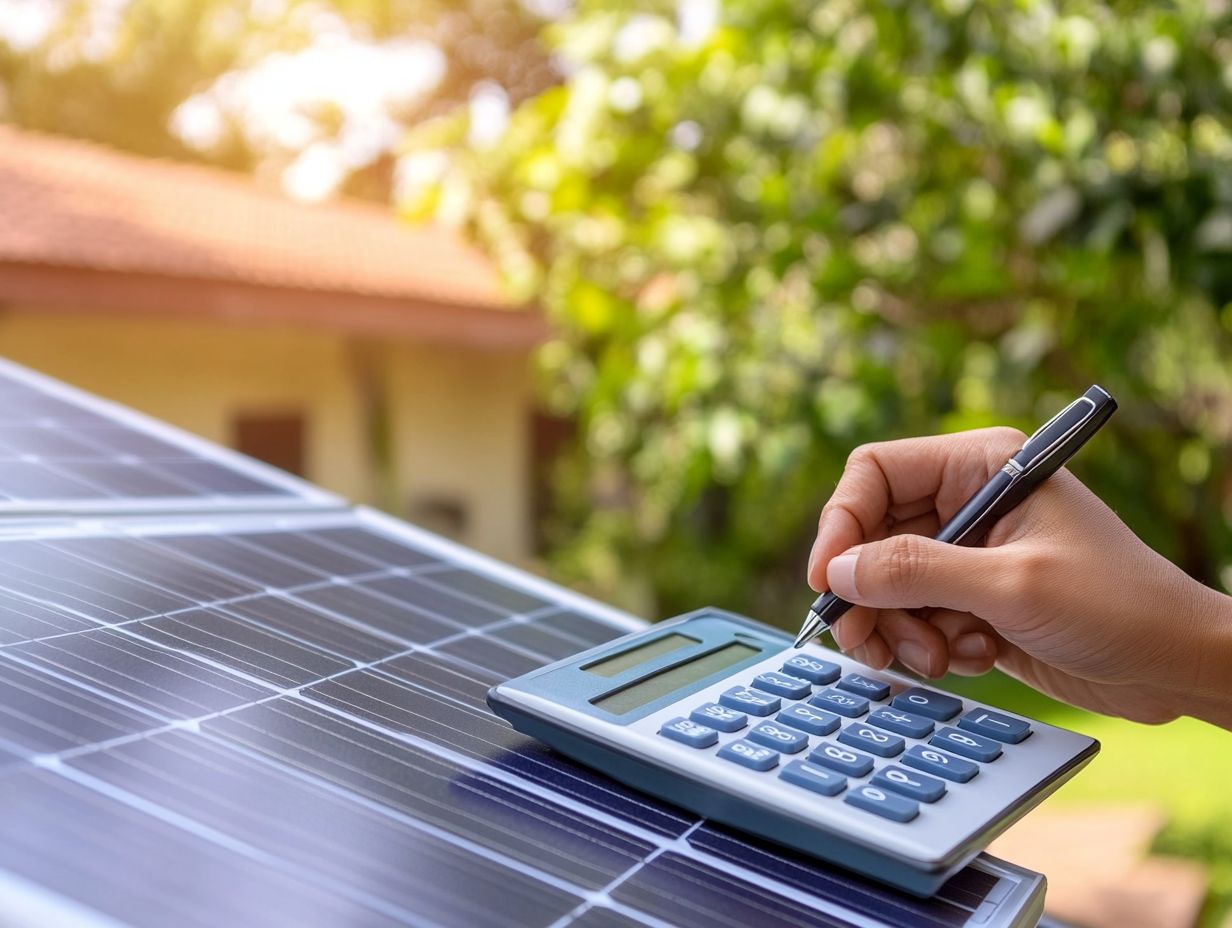How to Make the Most of Solar Incentives?
As the momentum for renewable energy builds, grasping the ins and outs of solar incentives becomes essential for homeowners and businesses eager to tap into the sun s potential.
This article delves into the different types of incentives available, outlining eligibility requirements and offering tips to help you maximize your savings. It also sheds light on common pitfalls to avoid while presenting alternative strategies for achieving cost-effective solar solutions.
By the end, you ll be equipped with the knowledge necessary to make informed decisions and fully optimize your solar investment.
Contents
- Key Takeaways:
- Eligibility Requirements for Incentives
- Maximizing Solar Incentives
- Common Mistakes to Avoid
- Other Ways to Save on Solar
- Frequently Asked Questions
- Can I still receive solar incentives if I lease my solar panels?
- How do I know if I qualify for solar incentives?
- Do I have to apply for solar incentives or are they automatically applied?
- What is the best way to maximize my solar incentives?
- Are there any tax implications associated with solar incentives?
- Can I combine multiple solar incentives?
Key Takeaways:

- Stay informed on the various types of solar incentives available to ensure you make the most of potential savings.
- Make sure you meet the eligibility requirements for incentives and take advantage of any criteria that may qualify you for additional benefits.
- Maximize your solar incentives by following tips such as researching local programs, comparing offers, and negotiating with installers.
Understanding Solar Incentives
Understanding solar incentives is essential for you as a homeowner thinking about getting a solar panel system. These incentives can significantly lower your overall installation costs.
There are various programs available at both federal and state levels that offer financial assistance and rebates, encouraging the transition to clean energy solutions. Familiarizing yourself with these options can ease the financial strain associated with solar energy investments, ultimately leading to considerable long-term savings on your energy bills while also contributing to a sustainable future.
Types of Incentives Available
You have access to a variety of solar incentives as a homeowner, including federal tax credits, state rebates, and incentives based on how much energy you produce provided by utility companies.
These incentives can significantly lower the upfront costs of installing solar energy systems. A standout option is the Federal Solar Tax Credit, which enables you to deduct a substantial percentage of your solar installation costs from your federal taxes. Many states offer specific rebates that can further boost your financial savings. You might also benefit from performance-based incentives, where payments are linked to the actual energy your solar system generates, typically managed through your utility provider.
Utility companies play a vital role in advancing renewable energy by implementing programs that not only encourage solar adoption but also facilitate net metering, which means you get paid for the extra energy your solar system sends back to the grid.
Eligibility Requirements for Incentives
Eligibility requirements for solar incentives can differ greatly between federal and state programs, making it essential for you to grasp these criteria to fully capitalize on the benefits available.
Typically, you ll need to meet specific conditions, including the type of solar system you install, your location, and your income level, to qualify for financial assistance like tax credits or rebates.
Grasping these criteria is crucial for maximizing your solar investments and ensuring you take full advantage of the opportunities at hand.
Criteria for Qualification

The criteria for qualifying for solar incentives typically encompass factors such as the type of solar panel system you install, the installation date, and adherence to specific regulations.
Beyond these fundamental aspects, your system’s performance plays a pivotal role in determining your eligibility for tax exemptions. You must ensure that your solar setup meets established efficiency benchmarks, as this will significantly influence your potential savings.
Engaging certified installers is essential. These professionals ensure proper installation, which directly impacts performance ratings.
Having the right documentation like receipts and proof of installation is crucial for claiming available tax credits. Additionally, your income levels can affect the extent of your benefits from these incentives.
By grasping these criteria, you re on your way to maximizing your financial assistance and contributing to a cleaner, greener world!
Ready to dive into solar energy? Start your journey to savings and sustainability today!
Maximizing Solar Incentives
To truly maximize solar incentives, you should take strategic steps to capture the full range of benefits available through various rebates and tax credits.
This means doing thorough research on the programs at your disposal and seeking expert guidance. It s also vital to understand the timelines for your applications.
By adopting a well-informed strategy, you can significantly lower installation costs and elevate the financial viability of your solar energy systems.
Tips for Maximizing Savings
Maximizing your savings from solar incentives requires a proactive mindset and a solid understanding of the financial options at your disposal.
Compare quotes from different solar installation companies. This helps you make informed decisions that match your budget and energy needs.
It s equally essential to stay informed about changing regulations that can impact solar energy. Changes in regulations can affect your savings and eligibility for incentives.
Leveraging online resources can help you navigate the myriad of incentives available across different states, providing you with a clearer picture of what to expect.
Understanding local utility policies and renewable energy rules is crucial, as this knowledge can dramatically influence the overall efficiency and savings from your solar investment.
Common Mistakes to Avoid
Homeowners frequently encounter common pitfalls when exploring the realm of solar incentives. Steering clear of these missteps can yield substantial savings over time.
A misunderstanding of eligibility criteria, neglecting to research all available incentives, or forgoing a consultation with a tax professional may result in missed opportunities for valuable financial support through federal and state tax credits or rebates.
Being aware of these potential errors is crucial for any homeowner contemplating a solar energy installation.
Pitfalls to Watch Out For

Watch out for common pitfalls that could cost you! Many individuals often rely on a single source of information, which can skew their understanding of the options at hand.
This limited research can lead to missed opportunities or even expose you to potential scams. Failing to verify the legitimacy of installers can leave you vulnerable to subpar service or inflated costs.
It s also vital to consider the long-term implications of tax credit rules; overlooking these regulations might result in unexpected financial repercussions later on.
By being mindful of these common mistakes, you can navigate the solar landscape more effectively and maximize your incentives.
Other Ways to Save on Solar
Along with leveraging tax credits and state rebates, you can explore a variety of strategies to maximize your savings on solar energy investments.
Consider incorporating battery storage solutions, which can significantly enhance your energy efficiency and make your solar system even more effective.
Alternative Cost-Saving Strategies
Homeowners like you seeking innovative cost-saving strategies for solar energy should definitely consider options such as community solar programs or financing plans that make installation more accessible.
By participating in community solar projects, you can tap into renewable energy sources even if your roof isn t suitable or if the upfront investment in traditional solar panels feels daunting.
These programs allow you to share the advantages of a larger solar farm, typically located nearby. Financing options, such as solar loans or leases, further alleviate initial costs, enabling you to enjoy immediate savings on your energy bills.
Integrating battery storage systems into these arrangements boosts energy efficiency, allowing you to store surplus energy for use during peak demand times. This ensures you reap substantial savings over the long haul.

Frequently Asked Questions
Act now to avoid missing out on potential savings!
Can I still receive solar incentives if I lease my solar panels?

Yes, you can receive solar incentives if you lease your panels. However, the leasing company receives these incentives, not you.
How do I know if I qualify for solar incentives?
Requirements for solar incentives depend on your location and the type of incentive. You typically need to use a certain amount of renewable energy or have a specific solar system.
Do I have to apply for solar incentives or are they automatically applied?
You usually need to apply for solar incentives. Contact your local utility company or state government to understand the application process.
What is the best way to maximize my solar incentives?
Research all available incentives in your area. Work with a reputable solar installer who understands these incentives to maximize your benefits.
Are there any tax implications associated with solar incentives?
Receiving solar incentives may affect your taxes. Consult a tax professional to understand any implications before accepting incentives.
Can I combine multiple solar incentives?
You can often combine multiple solar incentives to lower your solar system costs. Check each program to see if they allow stacking of incentives.






